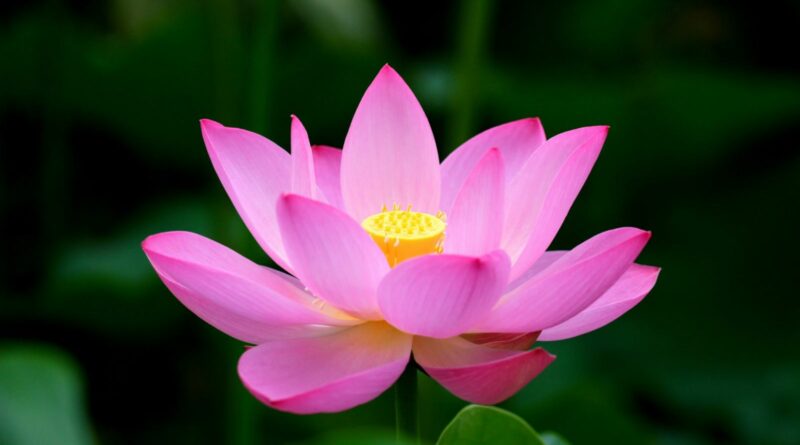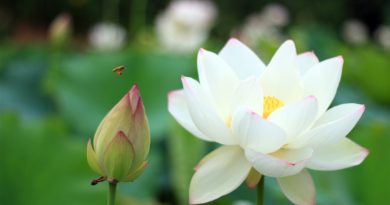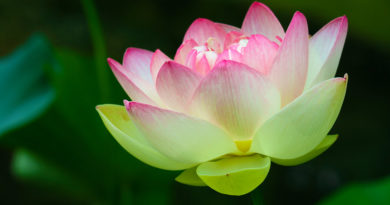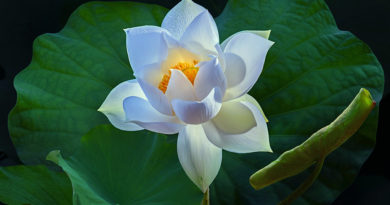Answers By Mr. S. N. Goenka: Morality(sila)
-We should lead a moral life, but morality is deteriorating in the whole world.
Mr. S. N. Goenka: It is all the more important that Dhamma should arise at this time, when morality is deteriorating! The time when there is darkness all around is the time when the day should break, the sun should arise.
-You yourself say that people can have wonderful meditation experiences without maintaining the precepts. Isn’t it then dogmatic and inflexible to put so much stress on morality?
Mr. S. N. Goenka: I have seen from the case of a number of students that people who give no importance to sīla (moral conduct) cannot make any progress on the path. For years such people may come to courses and have wonderful experiences in meditation, but in their daily lives there is no change. They remain agitated and miserable because they are only playing a game with Vipassana as they have played so many other games. Such people are real losers. Those who really want to use Dhamma in order to change their lives for better must practice sīla as carefully as possible.
(Courtesy: International Vipassana Newsletter, April 1986 issue)
-Compared to most other teachers, your courses put much heavier emphasis on discipline and morality. If one sīla [moral precept] is broken, surely it should not be such a big issue. Your attitude is too fundamentalist
Mr. S. N. Goenka: Understand: Following the Five Precepts means that you abstain from any unwholesome action, vocal or physical, which will disturb others. The Precepts are part of this technique; they are the foundation of this technique. If the foundation is weak, you cannot build a house on it. The foundation is necessary at least for the 10 days of a course. If you keep on breaking your sīla, even one sīla, you will find there is a big storm in your mind, which you do not know now. As you practice, you go to the depth and you find what disturbance it creates. Every time you break a sīla, you have to generate a defilement. And every time you generate a defilement, there is a great disturbance in the mind. How can you go to the depth of the mind then? It becomes difficult. Therefore, for those 10 days, you have to observe sīla, you have to work in discipline. After 10 days, you are your own master. Nobody forces you, nobody comes to examine whether you are observing sīla or not. But you yourself will start understanding, “Every time I break sīla in my life, I am harming myself. I am harming myself and then I harm others.” And slowly you will start coming out of this old habit of breaking sīla.
(Ccourtesy: International Vipassana Newsletter, October 2012 issue)
-During the course sīla is easy to keep, but out there in everyday life it is not so easy
Mr. S. N. Goenka: You learn here how to keep sila outside. It’s not that you keep sila only on 10-day courses and then you forget about it. This technique will help you. You will understand by this technique that you can’t break sila without generating some impurity or the other in the mind. And you will understand that whenever you generate any impurity in your mind-anger, hatred, ego, passion, anything-you lose the balance of your mind, you become miserable. Whenever you break sila, you make yourself miserable. At the intellectual level you understand that you are keeping sila to help others, to keep from harming others. But deep inside, you also understand: I am not obliging anybody by observing sila; I am helping myself. By sila, I keep myself happy and peaceful, and I help others to remain happy and peaceful too.
(Courtesy: International Vipassana Newsletter, May 2002 issue)
-What is the importance of nourishment, sexuality and livelihood in helping or hindering progress in meditation?
Mr. S. N. Goenka: During an intensive meditation course it is essential that the meditator eat vegetarian food. Outside of that, it is sufficient that the meditator become moderate in nourishment, naturally taking care to eat healthy food. Many students become vegetarians naturally.
In the same way, during a course one is requested to abstain from any sexual activities, but in daily life you can continue to have sexual relations with your wife or husband. We have to also understand that the practice of Vipassana meditation leads you naturally to eliminate sexual desire. Gradually the meditator will become full of love for others without expecting anything in return. Passion is replaced by compassion. At this stage sexual activity becomes inadequate to express such pure love. Without any repression or suppression, the meditator enters into a stage of natural celibacy.
Regarding livelihood, a meditator can do any profession, but it should be a profession that does not harm other beings and that contributes to the welfare of others. In this regard, the most important thing is mental volition. Whatever job you are doing, you should do it with the feeling of serving society, in exchange for which you receive remuneration to maintain yourself and your family.
-What about sex within the framework of Vipassana?
Mr. S. N. Goenka: For a new Vipassana student, we don’t say that you have to have suppressed celibacy, forced celibacy. It is not healthy. It creates more difficulty, more tensions, more knots. So that is why the advise for a Vipassana student is have relations with one spouse, one man-one woman, and disciplined sex. And if both are Vipassana meditators, a time will come that they will naturally come out of the need for sex. Sex is not necessary. By nature, they are contented, so happy, the body relations have no meaning. But that should happen naturally, not forcefully. So as one starts practicing Vipassana, it is not necessary one should be celibate. But at the same time, there must be relations with only one person; otherwise, this madness will continue. Then the passion keeps on multiplying, one cannot come out of it.
-What is disciplined sex?
Mr. S. N. Goenka: Disciplined sex is where you don’t go mad about sex, where one is not a sex maniac. If one keeps running from one sexual relation to the other, one is not disciplined. If you are with one person, then naturally the sex relations becomes less. If you have sexual relations with many, then it multiplies. The law of nature is such. When you put petrol on the fire, the fire multiplies.
-What is the difference between right and wrong sexual conduct? Is it a question of volition?
Mr. S. N. Goenka: No. Sex has a proper place in the life of a householder. It should not be forcibly suppressed, because a forced celibacy produces tensions which create more problems, more difficulties. However, if you give free licence to the sexual urge, and allow yourself to have sexual relations with anyone whenever passion arises, then you can never free your mind of passion. Avoiding these two equally dangerous extremes, Dhamma offers a middle path, a healthy expression of sexuality which still permits spiritual development, and that is sexual relations between two persons who are committed to each other. And if your partner is also a Vipassana meditator, whenever passion arises you both observe it, at the level of bodily sensations as Vipassana trains you to do. This is neither suppression nor free licence. By observing you can easily free yourself of passion. At times a couple will have sexual relations, but gradually they develop towards the stage in which sex has no meaning at all. This is the stage of real, natural celibacy, when not even a thought of passion arises in the mind. This celibacy gives a joy far greater than any sexual satisfaction. Always one feels so contended, so harmonious. One must learn to experience this real happiness.
-Is the fifth precept to abstain from intoxicants or to abstain from being intoxicated? After all, drinking in moderation, without becoming drunk, does not seem particularly harmful. Or are you saying that drinking even one glass of alcohol is breaking sila?
Mr. S. N. Goenka: If you practise Vipassana seriously and one day you drink a glass of wine out of forgetfulness or at a social gathering, that day you will find that your meditation is weak. Dhamma cannot go together with the use of intoxicants. If you really wish to develop in Dhamma, you must stay free from all intoxicants. This is the experience of thousands of meditators. By drinking even a small amount, in the long run you develop a craving for alcohol. You don’t realize it, but you take a first step towards addiction, which is certainly harmful to yourself and othe-rs. Every addict starts by taking just one glass. Why take the first step towards suffering?
-Why is drinking only one glass of wine a breakage of sīla?
Mr. S. N. Goenka: One glass becomes more. So why not come out it from the very beginning?
Once one becomes addicted, it is so difficult to come out of the addiction. Why not refrain from anything that is addictive?
Another important reason is that if someone who has come out of all kinds of intoxicants and is progressing in meditation takes even a very small quantity of alcohol, that person will immediately feel that it creates agitation and will feel unhappy. They can’t take it.
Understand, with the experience of so many who have progressed, that this goes against Dhamma, against the purification of the mind. Ignorance causes impurities to develop and intoxicants are closely associated with ignorance. They drown all your understanding. Come out of them as quickly as possible.
-What is the definition of sin?
Mr. S. N. Goenka: Whatever defiles our mind is a sin. All vocal or bodily actions which disturb the peace and harmony of others, which harm others, first defile one’s own mind. Only then will one perform unwholesome actions. These are all sinful actions.
-You mentioned that we should choose a job or profession, which causes no harm to others. But the social system today is based on cheating and corruption. How is it possible to avoid corruption?
Mr. S. N. Goenka: It is unfortunate that there is so much corruption and dishonesty in this country. However, this does not mean that we too should become a part of it. We should follow the example of the lotus that grows in mud, in water, but rises above the water. Not a single drop of water can stick to it.
Similarly, we have to live a pure life in spite of living in a corrupt society. Whatever work we have to do, we will do it honestly. It will be difficult because the entire atmosphere is unfavourable. This is exactly what you are learning here.
No matter how unfavourable the situation, you are your own masters: the masters of your mind, the masters of your future. You can create a good future for yourself. You can create heaven for all instead of hell.
Therefore, however tough the situation, we will not commit any unwholesome deed, and automatically, Dhamma will start helping us.
-Why do you give so much importance to morality and maintaining the five precepts of sīla, in Vipassana courses?
Mr. S. N. Goenka: I have seen from a number of students that people who give no importance to sīla, or morality, cannot make any progress on the path. sīla is the foundation of Dhamma. When the foundation is weak, the whole structure will collapse. For years, such people may come to courses and have wonderful experiences in meditation, but in their daily lives there is no change. They remain agitated and miserable because they are only playing a game with Vipassana, as they have played so many games. Such people are real losers. Those who really want to use Dhamma in order to change their lives for better must practice sīla as carefully as possible.
-Why is it so important to maintain the Five Precepts on Dhamma land?
Mr. S. N. Goenka: It is important to observe the Five Precepts everywhere but it is especially important on Dhamma land.
The first reason is that it is so difficult to observe these precepts in the outside world. In daily life there are many reasons why people break their sīla. But on Dhamma land, where there is a wonderful Dhamma atmosphere, the influence of Māra is much weaker than in the outside world, so you should take advantage of this to strengthen yourself in sīla. If you cannot observe sīla in an atmosphere like this, how can you expect to maintain sīla in the world? How will you develop in Dhamma?
Secondly, it is meritorious to observe sīla anywhere, but observing sīla on Dhamma land is more meritorious. Equally, it is harmful to break sīla anywhere, but breaking sīla on Dhamma land is more harmful. Understand why this is so. As soon as a defilement is generated in the mind you contribute a bad vibration to the atmosphere, and you can’t break any sīla unless some impurity first comes in the mind and then manifests as an unwholesome action of speech or body. If you generate that kind of vibration in a marketplace full of unhealthy vibrations, you contribute something bad to the atmosphere, no doubt. But it is already full of bad vibrations, so your contribution is inconspicuous—just as a new stain on a dirty shirt is inconspicuous. But if you generate mental defilements in the good atmosphere of a centre, you pollute the atmosphere in the same way that even a tiny spot of dirt spoils a clean white shirt.
The mind doesn’t stay idle; it generates either impurity or purity. When you don’t generate impurity you generate purity, good vibrations, and these are your positive contributions to the atmosphere. After all, how does land become Dhamma land? By the meditation of good-hearted people generating good vibrations, which permeate the atmosphere. This is your dāna to the centre, and it is far superior to material dāna.
The more people who meditate in one place, the stronger the vibration becomes. And the good vibrations at a Dhamma centre are helpful not only to those who attend the present courses; they also accumulate. This atmosphere of pure Dhamma will support students for generations, for centuries. You don’t know who will come to your centre after five or ten generations, after centuries. What a wonderful gift you are giving to those unknown people. Your dāna is wonderful.
Equally, the negative vibrations you generate are harmful not only to the present meditators, but also to future meditators who won’t get the strong, good atmosphere that they should. That is why it is important to observe sīla on Dhamma land. It is fruitful for the one who generates good vibrations by observing sīla, and fruitful for others now and in the future. Therefore observe sīla. It is the foundation of Dhamma. Keep this foundation strong.
-Why is there segregation of sexes on a course?
Mr. S. N. Goenka: This would not have been necessary if we were working with other types of meditation which impose a good layer at the surface of the mind, making you forget everything that is deep inside.
But this technique is totally different. From the very beginning it starts an operation of the mind, taking out the impurities from the deepest level. When you operate on a wound, only pus will come out; you can’t expect rose water to come out. What is the pus of the mind? Now the worst pus that you have is sexual passion. The entire loka in which you are living is called kāma-loka, the loka where sexual passion is predominant. Even at the apparent level your birth is because of the sexual contact of your parents. The base of sexual passion is deep inside. And if sexual passion comes on the surface, it becomes stronger for a male when he is in contact with the vibration of a female. When a female develops passion, it is strengthened by contact with the vibrations of a male. And if you remain intermingled while you are doing this operation, it is dangerous. It will harm you. Instead of your coming out of passion, there is every possibility that you will multiply passion. So better remain separated as much as possible. It is essential.
Source: https://www.vridhamma.org







